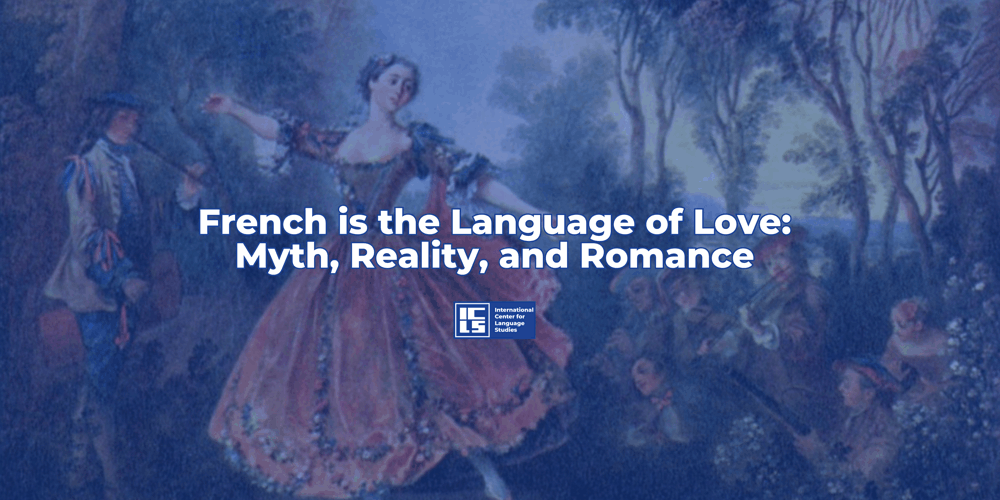French is the Language of Love: Myth, Reality, and Romance

For centuries, French has been dubbed “the language of love,” a reputation that continues to enchant people worldwide. Whether it’s the flowing sound of the words, the romantic associations with French culture, or its historical significance, French holds a unique place in the global imagination. But what exactly makes French the language of love, and how much of this reputation is based on reality versus an overly romanticized view of the country and its culture?
In this blog post, we’ll discuss the origins of this perception, examine the characteristics of French that contribute to its romantic allure, examine the role of culture and history in shaping this perception, and address the phenomenon of "Paris Syndrome," a psychological condition that emerges when visitors’ idealized expectations of Paris clash with reality.
The Origins of the “Language of Love” Myth
The association between French and romance can be traced back to the courtly love traditions of medieval France, when poetry and chivalry played central roles in aristocratic life. Troubadours, the poet-musicians of the time, would compose and sing verses dedicated to love, longing, and admiration for noble women. These poems, written in Old Occitan and later in Old French, celebrated the ideals of chivalry and romantic love, setting the foundation for the image of French as a poetic, emotional language.

By Unknown author - This file comes from Gallica Digital Library and is available under the digital ID btv1b8419245d, Public Domain, https://commons.wikimedia.org/w/index.php?curid=26631252
In the Renaissance, this romantic legacy was cemented as French became the language of diplomacy and literature across Europe. The French aristocracy, especially during the reign of Louis XIV, embraced art, music, and theater, making French the de facto language of refinement, elegance, and sophistication. These associations continued to grow over time, especially with the rise of French literature in the 19th century, when writers like Victor Hugo (Les Misérables, The Hunchback of Notre Dame) or Charles Baudelaire (Les Fleurs du Mal) captured the hearts of readers with their emotional depth and passion.
The Sound of Romance
If you’ve ever heard someone speak French, you may understand why it’s often described as a melodic or “flowing” language. The softness of the sounds, the musicality of its cadence, and the way words seem to glide together all contribute to this perception. In fact, linguists point out several characteristics of French that may explain its romantic appeal:
- Smooth Flow of Words: French pronunciation tends to blend sounds together. The use of liaison, where the final consonant of one word is linked to the first vowel of the next, creates a seamless transition between words. This gives the language a fluid, harmonious quality.
- Soft Consonants and Vowels: French relies on softer consonant sounds (like “s” and “v”) rather than the harsher stops found in languages like German or English (such as “k” or “t”). The French “r,” pronounced in the back of the throat, also gives the language a distinctive softness. French vowels tend to be open and round, which further adds to its “melodic” quality.
- Rhythm and Intonation: French intonation tends to rise and fall smoothly, giving it a “sing-song” quality that many find appealing. The lack of sharp stress patterns, which are common in English, adds to its gentler tone.
This combination of sounds makes French pleasing to the ear, and perhaps, subconsciously, listeners associate the language’s flowing nature with a sense of tenderness and affection.
Watch this funny video clip where women hear different languages while blindfolded and decide which language is the sexiest.
Cultural Reinforcement: France as the Land of Romance
Of course, the perception of French as the language of love is not just about the sound of the language—it’s also deeply tied to French culture. France itself has long been associated with romance, and cities like Paris are often seen as the epitome of love and passion.
Paris has played a crucial role in shaping the “language of love” narrative. Often referred to as the “City of Love,” Paris has been the backdrop for countless films (Paris Je T’aime), literary love stories (Dangerous Liaisons by Pierre Choderlos de Laclos), and paintings (Chagall’s Lovers over Paris). The image of lovers strolling hand-in-hand along the Seine, sipping wine at a café, or gazing at the Eiffel Tower has become iconic, reinforcing the idea that France—and by extension, the French language—represents romance in its purest form.

Several neighborhoods epitomize Paris' reputation as the "City of Love" through their unique blend of history, art, and timeless charm. Montmartre, with its winding streets and artistic legacy, feels like a living postcard of romance, capturing the bohemian spirit that has long inspired poets and lovers. Le Marais, with its medieval architecture and hidden courtyards, offers an intimate and elegant atmosphere perfect for leisurely strolls. Île Saint-Louis provides a quiet, almost secluded haven in the heart of Paris, where the calm of the Seine envelops you in tranquility. Saint-Germain-des-Prés, steeped in intellectual and cultural history, invites couples to linger in iconic cafés, evoking the literary romance of Parisian life. Lastly, Canal Saint-Martin, with its scenic footbridges and relaxed vibe, represents the modern, laid-back side of Parisian romance, offering a peaceful escape for those seeking a quieter, more contemporary connection with the city. Together, these neighborhoods capture the essence of Paris as a city where love, art, and history come together in perfect harmony.
The French lifestyle also adds to this romantic mystique. The emphasis on pleasure, whether in food, wine, or art, creates an environment where passion and emotion are celebrated. French cuisine, known for its indulgence and finesse, is often tied to romantic experiences, from candlelit dinners to the famous sharing of macarons and champagne. This cultural backdrop makes French feel like the natural language for expressing love and affection.
Paris Syndrome: When Reality Clashes with the Ideal
However, the romantic image of France, and especially Paris, is not always in line with reality. One striking example of this is the Paris Syndrome, a psychological condition that affects some visitors, especially from Japan, who arrive in Paris with overly idealized expectations, only to be met with the realities of city life.
Paris Syndrome was first identified by Japanese psychiatrist Hiroaki Ota in the 1980s. Tourists, particularly from cultures where Paris is idealized as the epitome of beauty, romance, and refinement, often experience a form of culture shock upon encountering the grittier aspects of the city. While Paris is undeniably beautiful, the daily realities of crowded streets, occasional unfriendliness, and urban challenges like homelessness and pollution can starkly contrast with the dream-like image they had envisioned.
Visitors experiencing Paris Syndrome may report symptoms such as anxiety, dizziness, and even hallucinations. These symptoms are often triggered by the realization that the Paris of their dreams—the one they had seen in movies and read about in books—does not fully exist. It’s a powerful reminder of how strong cultural stereotypes and romanticized ideals can be, and how they can deeply affect perceptions of a place, especially one so globally iconic as Paris.
This phenomenon also underscores the tension between language and culture. For many, the French language, particularly as spoken in Paris, has been romanticized in much the same way the city itself has. The beauty of the language, the rhythm, and its associations with love may create expectations that real-life interactions don’t always fulfill. French people, like those in any large city, can be hurried, distant, or even brusque, especially in tourist-heavy areas where the everyday stress of urban life comes to the fore.
Popular shows like Emily in Paris strongly contribute to the romanticized view of Paris, reinforcing unrealistic stereotypes about life in the city. The show presents an idealized version filled with charming cafes, fashion, and perfect work-life balance, while overlooking the real challenges of living in a bustling, diverse city. While the series is visually appealing, it feeds into the belief that Paris is a dream destination, often ignoring practical struggles such as dealing with bureaucracy, housing, and cultural differences. These portrayals can create unrealistic expectations, leading to disappointment when the reality of Paris does not match the idealized version seen on screen.
The Reality: Is French Really the Language of Love?
While French undeniably has characteristics that make it sound romantic, it’s important to recognize that love can be expressed beautifully in any language. The idea of French as the language of love is partly based on cultural myth-making, reinforced by centuries of art, literature, and media that have cast France and its language in a romantic light.
Still, French continues to captivate learners and lovers alike. Whether you’re learning French for travel, work, or to connect with someone special, there’s no denying that the language carries an emotional weight that transcends mere words.
In the end, French may not be the only language of love — but it will always hold a special place in the hearts of those who seek to express their feelings with a touch of elegance, passion, and poetry.
Step up to a next level learning experience with ICLS, where diplomats and global professionals sharpen their French language skills. Whether you prefer private instruction or a group class, we've got you covered.


